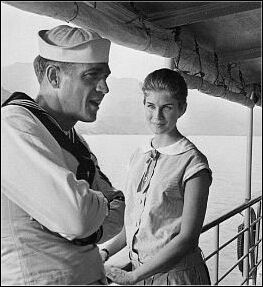By BOSLEY CROWTHER
It is likely that audiences seeing the film Robert Wise has made from Richard McKenna's popular novel, "The Sand Pebbles," will not see it simply as a tale of the involvement of a United States Navy gunboat on the Yangtze River in China in 1926.
Although it gives a fascinating picture, characteristically exotic and confused, of the challenges to our tiny forces when they found themselves suddenly exposed to the explosion of the Nationalist revolution engineered by Chiang Kai-shek, it is not as historical romance that it is likely to grab the audience, but as a weird sort of hint of what has happened and is happening ln Vietnam.
The environment is pertinent in this picture, which opened at the Rivoli last night. Broad, ocher Oriental rivers spreading among gray green hills and cut by a shallow-draft gunboat flying the American flag; old cities crowded with people, yellow faces in black blouses and student caps, peasants toiling slowly in rice paddies - in these we sense a realm of present peril.
In the shock of the gunboat's captain as he finds his long-time prestige and power suddenly unbalanced and assaulted by the rebellious Chinese, we sense the reverberating tremors of our own, national shock and dismay when we found ourselves grimly confronted with a more recent Oriental responsibility.
In the ire and resentment of his crewmen as they have to take on the task of fetching American citizens out of the bristling hinterland, we feel the tightening muscles and the quivering nerves of American men in Vietnam. And in the open suspicion and frank withdrawal of the focal "China sailor" in this case, we catch the current vibrations of antagonism towards our present jam.
Thus, because it is so graphic and metaphorically so aligned with our current dilemma in the Far East, "The Sand Pebbles" as a film has a great deal more pertinence and likely impact than it has as a book. And this realization compels us to scan it the more inquisitively. What is it these fellows are saying, in

Jake Holman........Steve McQueen
Frenchy................Richard Attenborough
Lieut. Collins.........Richard Crenna
Shirley Eckert........Candice Bergen
Po-han.................Mako
Mr. Jameson.........Larry Gates
Ensign Bordelles....Charles Robinson
Stawski................Simon Oakland
Harris...................Ford Rainey
Cho-Jen...............Paul Chinpae
Chien...................Tommy Lee
Mama Chunk.........Beulah Quo
Victor Shu.............James Hong
Bronson................Joe Turkel
Crosley................Gavin MacLeod
Shanahan.............Joseph di Reda
Major Chin............Richard Loo
this brooding and turbulent film, which ranges from crew's mess confrontations to the bloody business of breaking through a river blockade? They are saying, in implications that might be more forcefully arranged in the script that Robert Anderson has shaken loose from the book, that the use of American forces to protect our interests and our nationals in a foreign land, especially one in political turmoil, is a fruitless and ironic enterprise.
They are saying that the diplomatic systems of showing the flag and saving face and rushing to the rescue of nationals (missionaries in this case) who don't want to be saved and especially the old vestigial practice of taking a superior attitude towards an "inferior" race - are arrogrant, hypocritical and conducive to remote, vainglorious death.
This is particularly spoken in the monosyllabic things said and in the desperate deeds done by the sailor who stands out from all the rest of the goof-offs, yardbirds and barflies, in the crew of the wheezy San Pablo - the Sand Pebbles, as she is tagged. He is a lonely, alienated machinist's mate
first class, whose only bond of attachment is with the engines of his ship. He is coolly distrustful of authority, he respects those who understand machines, and he stands off from a pretty missionary who would offer him sympathy and maybe love.
And it is in the fate of this fellow, this non-hero, performed by Steve McQueen with the most restrained, honest, heartfelt acting he has ever done, that we see the ultimate reward for the kind of service he ruefully performs.
It is manifest, too, in the performance of his duties and in the final fate of the gun boat's captain, whom Richard Crenna makes a painfully conscientious type; stubborn and valorous in battle but never quite sure of himself.
Those two characters are the key ones in this film, which disturbingly achieves a crescendo of reluctant heroics after a too long establishment of its anti-heroes through too many service-film cliches. Richard Attenborough as the sailor who falls for a Chinese girl and gambles his life to be with her is the most hackneyed of the lot. Simon Oakland as a bruiser and Ford Rainey as an incipient mutineer are the closest to being plausible, outside of Mr. McQueen.
Of the Chinese, a lad, named Mako is the gamiest and most credible as a coolie member of the "black gang" (the engine-room crew) who is cruelly sacrificed. Henry Wang as the bearded boss coolie and Tommy Lee as the black gang boss make excellent displayers of the coolie system. Marayat Andriane is conventional as the 'innocent girl' Mr. Attenborough buys and weds.
Larry Gates makes a stubborn missionary, a little too grossly cast to type, and Candice Bergen is beautiful and flawless as his loyal associate.
Thus we end, up in "The Sand Pebbles" with a beautifully mounted film, shot by Mr. Wise to lovely color, mostly in the area of Taiwan; a curiously turgid and uneven attempt to generate a war romance, and a finally forceful and depressing blast at getting into trouble over our heads.